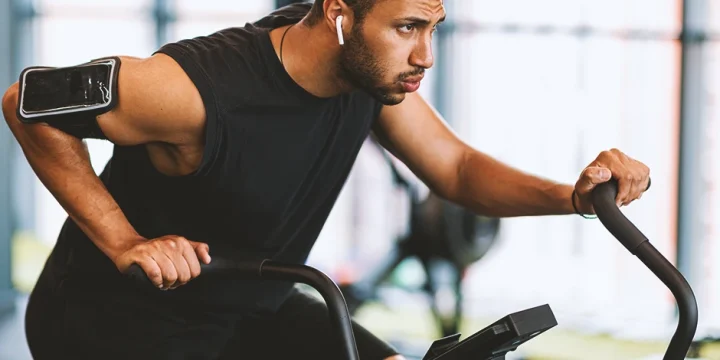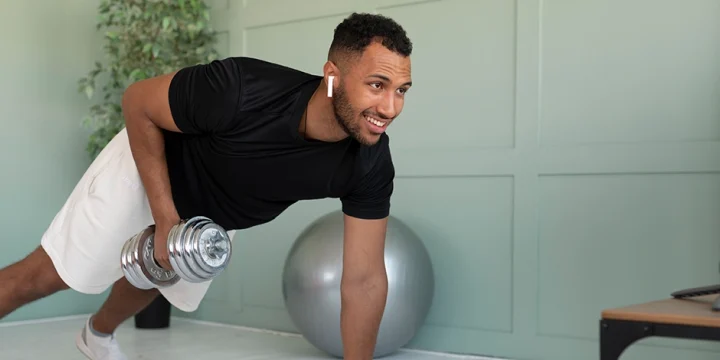As a fitness trainer, I have helped many clients understand the importance of a higher metabolism in achieving fitness goals.
To identify effective metabolism-boosting methods, I consulted colleagues and reviewed online research publications.
This article covers metabolism-influencing factors, lifestyle changes, and exercises to increase caloric burn and improve health. By implementing these strategies, you’ll be on your way to a consistently faster metabolism.
Let’s begin.
Quick Summary
- Permanently increasing metabolism requires an active lifestyle, a balanced diet, and adequate rest.
- Combining resistance training and protein-rich foods is key to speeding up metabolism and increasing calorie burn.
- The effectiveness of strategies to improve metabolism, such as HIIT training and a balanced diet, is widely recognized although specific statistics are not detailed in the article.
- In my opinion, adopting a holistic approach that includes diet, exercise, and lifestyle is the most effective strategy for sustainably improving metabolism.
How To Increase Your Metabolism

Before we look at several proven methods to boost your slow metabolism, let’s review what metabolism is.
What is Metabolism?
Metabolism refers to the various chemical processes constantly occurring in your body. It determines the number of calories your body requires.
The faster your metabolism, the more calories you burn.
Basal metabolic rate (BMR) is the indispensable energy your body needs for fundamental physiological functions like breathing, heartbeat, and body temperature regulation.
It is the metabolic rate required to keep your body ticking while at rest or asleep.
Resting metabolic rate (RMR), the energy for basic activities and bodily functions at rest, increases with muscle mass [1].
Individuals with more muscle have a higher resting metabolic rate.
Many of my clients successfully use an all-natural fat burner to support their efforts.
While I remind them that there is no fast fix, these supplements certainly have their place.
Eat Regularly

Following a consistent meal pattern is vital for good health and can significantly benefit your body.
Eating at regular intervals can improve metabolism, reduce inflammation, and promote gut health by managing bacterial composition [2].
Eat Fat-Burning Foods

Certain foods boost your metabolism and promote fat burning.
Green Tea
Drinking green tea can increase metabolism and promote fat burning by converting stored body fat into free fatty acids [3].
With their low calorie content, green tea benefits weight loss and maintenance.
In addition, their metabolism-boosting properties may help prevent weight loss plateaus caused by a decrease in metabolism.
Spicy Foods
Capsaicin in hot peppers can boost metabolism, though its effectiveness varies among individuals.
But not everyone can tolerate the amount of spice needed to produce a significant effect.
Remember that more than just adding spices to your diet is required to produce substantial results.
However, it can make a slight difference when combined with other metabolism-boosting strategies [4].
Related: Does Spicy Food Burn Fat
Caffeine
Research on the National Library of Medicine website shows coffee has a temporary metabolic-boosting effect due to the presence of caffeine. Like green tea, coffee promotes fat burning, and combining these effects can be beneficial for weight loss [5].
A study shows caffeine's impact on fat burning during exercise varies, being more effective for less active individuals than for trained athletes [6].
“"You can manipulate your metabolism to a degree, it is often a small change that may help you burn more calories. That, along with adopting a healthier diet and making sure you get enough exercise, may give people the extra push they need to lose and maintain weight."
- Dr. Chih-Hao Lee, Harvard's T.H. Chan School of Public Health
Also Read: Does Caffeine Help You Lose Weight
Eat More Protein

Some foods increase metabolism temporarily, leading to more calories burned post-meal.
This temporary increase is caused by the extra energy required to digest, absorb, and process nutrients [7].
Protein requires a whopping 20–30% of its usable energy just for metabolism, compared to 5–10% for carbs and 0-3% for fats [8].
Additionally, eating more protein can help prevent muscle loss and boost metabolism during weight loss, counteracting the drop in metabolism that generally comes with dieting.
Eat Enough Calories
Excessive calorie restriction can slow metabolism, making weight loss harder.
Skipping meals to lose weight may be counterproductive, as it can lead to a slower metabolism.
You actually burn calories when you digest food.
Even eating meals that are not satiating enough can have a similar effect, warns the Academy of Nutrition and Dietetics [9].
Do Resistance Training

Muscle is metabolically more active than fat [10].
Increasing muscle mass can boost your metabolism, allowing your body to burn more calories even at rest.
High-Intensity Interval Training
Studies suggest that HIIT is particularly effective for burning fat compared to other forms of exercise.
HIIT, with its quick and intense bursts of activity, can increase your metabolic rate and fat burning, even after your session [11].
Drink Enough Water

Switching to water from sugary drinks is a powerful tool in the battle against weight gain.
Preliminary studies show that drinking water can increase your metabolism for a short time, allowing it to burn off up to 30% more calories and help with weight management [12].
Additionally, drinking water before meals can help curb your appetite and help you consume fewer calories.
In one study, those who drank 17 ounces of water 30 minutes before meals over three months lost nearly three pounds more than those who didn’t [13].
Reduce Stress
Stress can wreak havoc on our bodies and indirectly impact our metabolism by affecting our eating habits and sleep patterns.
Get Enough Sleep

Research suggests that the body may reduce the metabolic rate to conserve energy during periods of sleep deprivation.
One study shows that inadequate sleep can lead to a decrease in metabolic rate.
This study, conducted in a sleep laboratory, found that participants who slept only 4 hours per night for five nights experienced a drop in metabolic rate.
However, after one night of recovering with 12 hours of sleep, their metabolic rate returned to normal [14].
The CDC recommends adults sleep at least seven hours per night [15].
Get Enough Vitamins
Vitamins, especially B vitamins, are crucial for lipid metabolism, affecting substances like cholesterol and triglycerides [16].
While further investigation is necessary, the link between vitamins, metabolism, and weight loss is intriguing.
“Multiple factors affect metabolic rate, or the number of calories burned. These include age, muscle mass, body size, and physical activity.”
- Atli Arnarson BSc, PhD
Does Dieting Affect Metabolism?

Yes, dieting can affect metabolism.
Moderate weight loss can lead to burning fewer calories at rest.
Incorporating resistance training and sufficient protein intake helps preserve lean muscle mass, maintaining metabolism during weight loss.
How Long Does It Take To Speed Up Your Metabolism?
From my experience, the time it takes to speed up your metabolism varies widely. It depends on factors like activity level, diet, body mass index, age, and health status. For instance, clients with a higher body mass index often see noticeable changes with consistent exercise and dietary adjustments.
How Do You Reset Your Metabolism?

You cannot reset your metabolism, but you can do things to increase your metabolic rate.
These include:
- Incorporate strength training to build more muscle mass
- Eat protein-rich foods to burn more calories
- Get enough rest
- Eat enough because calorie restriction can slow your metabolism
- Incorporate high-intensity exercise to burn fat
What Is The Most Natural Way To Increase Metabolism?
The most natural way to increase metabolism is to maintain an active lifestyle, eat a healthy diet, and get enough rest.
Additionally, staying hydrated, eating certain foods, and doing aerobic exercise and weight lifting will promote fat metabolism.
Including protein-rich, fibrous, and healthy fat foods like lean meats, whole grains, and avocados boosts metabolism. Regular aerobic and strength exercises, such as brisk walking, cycling, and weight lifting, also enhance fat metabolism.
FAQs
What Triggers Fast Metabolism?
The best thing that triggers a fast metabolism is physical activity. Perform a combination of weight training and cardio. High-intensity workouts are particularly effective at improving calorie burn and metabolic rates.
How Many Meals A Day Should I Eat To Speed Up Metabolism?
How many meals you eat a day to speed up your metabolism is based on personal preference. Some encourage eating smaller meals more frequently, while others believe in three larger meals. The key is to eat regularly, and remember that your metabolism slows if you eat too few calories.
References:
- https://www.webmd.com/fitness-exercise/difference-between-bmr-and-rmr
- https://pubmed.ncbi.nlm.nih.gov/31021710/
- https://pubmed.ncbi.nlm.nih.gov/28275131/
- https://pubmed.ncbi.nlm.nih.gov/33063385/
- https://pubmed.ncbi.nlm.nih.gov/27824614/#
- https://www.ncbi.nlm.nih.gov/pmc/articles/PMC7760526/
- https://pubmed.ncbi.nlm.nih.gov/31021710/
- https://pubmed.ncbi.nlm.nih.gov/25926512/
- https://www.eatright.org/health/wellness/weight-and-body-positivity/4-ways-low-calorie-diets-can-sabotage-your-health
- https://www.ncbi.nlm.nih.gov/pmc/articles/PMC3661116/
- https://www.ncbi.nlm.nih.gov/pmc/articles/PMC5688014/
- https://www.ncbi.nlm.nih.gov/pmc/articles/PMC4901052/
- https://pubmed.ncbi.nlm.nih.gov/26237305/
- https://www.ncbi.nlm.nih.gov/pmc/articles/PMC4701627/
- https://www.cdc.gov/sleep/about_sleep/how_much_sleep.html
- https://pubmed.ncbi.nlm.nih.gov/30074168/
About The Author
You May Also Like






